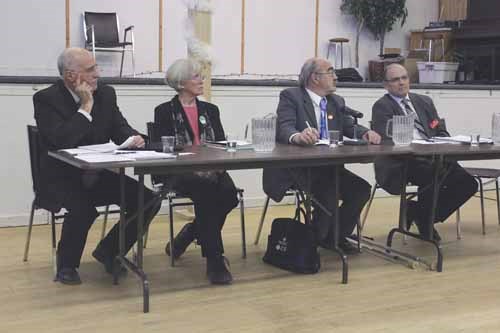Yorkton-Melville's federal election candidates defended their platforms at a forum hosted by Yorkton's Chamber of Commerce at the Royal Canadian Legion on April 13.
Each candidate was permitted a five-minute opening statement. In hers, Green Party candidate Elaine Hughes focused on various threats to the environment, including hydraulic fracturing, nuclear waste, and contamination of drinking water.
"So-called development is out of control, and the precautionary principle which says 'Do no harm' is not part of this country's environmental regulations," said Hughes.
The Green candidate called for limits to exploitation of natural resources and a shift to a low-carbon economy, which she called "the single biggest business opportunity in human history."
Incumbent Garry Breitkreuz of the Conservative Party stressed the importance of Canada's economy in his speech and warned of a coalition he believes the opposition parties are secretly planning. He promised to lower business taxes and to bring in new, tougher justice legislation.
"Our policies are for a free Canada that can stand tall in the world, defend itself, and have a confident future," concluded Breitkreuz.
The New Democratic Party's Doug Ottenbreit emphasized changes targeted directly at Canadian citizens: doubling public pensions, capping credit card interest rates, and lowering student debt.
"What I want to talk about are those things which matter to the people of this community: the day-to-day issues that we all have to deal with," Ottenbreit said.
The NDP candidate also promised to lower small business taxes and institute a tax credit to business owners who create new jobs.
The top priorities named by the Liberal Party's Kash Andreychuk in his opening remarks were engaging young voters, addressing First Nations issues, and protecting Saskatchewan interests. Andreychuck promised to engage with local communities to learn what issues matter to the riding.
"Our party invites participation from youth, women, seniors, First Nations, ethnic-everyone," he said.
The forum next moved into a series of prearranged questions provided by the Chamber of Commerce. On the subject of securing funding for expansions to the Yorkton Airport, the candidates' responses differed significantly. Elaine Hughes said she would prefer to eliminate the need for extra traffic at the Yorkton airport; the Green Party would in fact impose a two-year moratorium on airport expansions along with a carbon tax on aircraft fuel. The party would then fund teleconferencing infrastructure to meet the need for business communications.
Kash Andreychuk argued that the corporations interested in making use of the airport should pay for their own upgrades, and not the taxpayers.
Doug Ottenbreit said that the Yorkton Airport would be a "perfect candidate" for the NDP's proposed infrastructure spending program.
Garry Breitkreuz said that he has advocated for funding of Yorkton Airport upgrades in the past through the gas tax fund and the Airports Capital Assistance Program, and will continue to do so in the future.
Asked about programs to support Canada's youth, Andreychuk proposed incentives for businesses who hire young people, $1,000 in annual funding to all post-secondary students, and a new Early Childhood Learning and Care Fund.
Ottenbreit named government hypocrisy as the cause of apathy among young voters, and pointed to the NDP's plan to establish a new national childcare program, debt relief programs, and a job creation incentive as solutions.
Breitkreuz said that his party's plan to lower business taxes would lead to the hiring of more students. Lowering the deficit would also reduce the burden of Canada's debt for future generations, he said.
Hughes proposed new loan and bursary programs for students and promoted the Green Party's plan to establish a Youth Community and Environmental Service Corps which would provide employment to 40,000 young Canadians each year.
The crowd became more vocal once the forum was opened to questions from the floor, with Garry Breitkreuz provoking the liveliest audience responses of the night.
The incumbent drew loud groans and a smattering of applause when he continued to stress the dangers of an opposition coalition with the Bloc Québécois after it had been pointed out by Ottenbreit that a similar coalition was proposed by Stephen Harper in 2004.
One of the final questions of the evening asked each candidate to declare his or her stance on the Canadian Wheat Board and its monopoly powers.
Hughes admitted that she was not well-versed on the issue, saying that in principle she supported the benefits of collective negotiation that the CWB provides farmers, but not its enforced monopoly on the marketing of western wheat and barley.
Andreychuk said that based on polls indicating support from a majority of local producers for the Wheat Board, he would advocate for the continued existence of the CWB in its current form.
Ottenbreit expressed strong support for the CWB, which he said offers essential protection to small farmers.
Breitkreuz said he believes farmers should be given a choice in how they market their grain.
In their closing statements, the four candidates reiterated the key points of their platforms.
Ottenbreit argued for increased social programs and a redirection of military spending: notably, purchasing ships to patrol Canadian waters rather than aircraft for overseas missions.
Breitkreuz emphasized his long years of experience in Parliament, his advocacy of hunting and fishing rights, and his pro-life stance.
Hughes said that Canada needs to become a sustainable society that acts "for the common good" and emphasized the need for democratic reform.
Andreychuk called for a return to civility in government so that the country can focus on issues that matter.
The federal election is on May 2.




